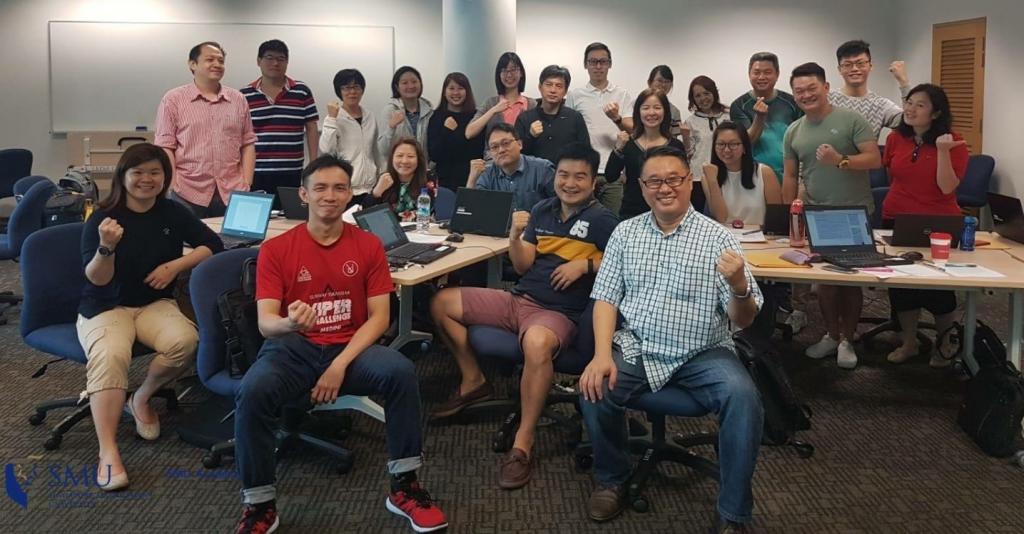Lean Six Sigma Green Belt Certification
- Innovation & Business Improvement
This programme is conducted on-campus.
To use your SkillsFuture Credit, please submit your claim through our payment portal. Do not submit the claim manually via the SkillsFuture page. Please refer to our step-by-step guide here.
Intake 95
6 days
Weekdays (9am - 5.45pm)
*Classes for this intake will be conducted during the day.
Intake 96
9 days
Thursdays (7pm - 10.45pm)
Fridays (7pm - 10.45pm)
Saturdays (9am - 6.30pm)
*Classes for this intake will be conducted on weeknights and Saturdays.
Singapore Management University
Who Should Attend
- Managers/ Team leads
- Professionals seeking to lead improvement efforts in their work areas
- Anyone with an aspiration to lead projects
PREREQUISITES
- A Bachelor's Degree; or
- A Diploma with at least 1 year of working experience
- Must be employed
Overview
Conversely, a culture that lacks the skills and willingness to change and improve can inhibit the delivery of innovation and competitive advantage. Besides being competent in the functional skills and knowledge one is hired for, it is important for employees to have the skills and mindset to solve problems, innovate and be a catalyst for change in an organisation.

ABOUT THE COURSE
Lean Six Sigma introduces frameworks that improve customer experience and processes while retaining functional responsibilities at an introductory level, hence Green Belt. Participants will learn to apply their knowledge in improvement projects that often relates to their functional areas and project scopes. This is in contrast to a Lean Six Sigma Black Belt level that typically requires full-time multiple project responsibilities for improvements of a high level of scale, complexity and challenge.
A participant with Lean Six Sigma Green Belt certification reflects evidence of a high standard competency through rigorous training and assessment. This equips the participant to professionally embark in a career that would espouse continuous improvement using Lean Six Sigma.
Learning Objectives
- Appreciate the key principles, focuses, history and differences in Lean and Six Sigma
- Frame and define problems or opportunities, goals, and scope for improvement
- Understand the importance and key aspects of managing team and change for improvement
- Appreciate the tools in the Lean Six Sigma Green Belt toolbox; select and apply the tools according to the needs of a project in terms of measurement, analysis, innovation, implementation and sustaining the benefits
- Understand and manage the improvement project and process using the framework
Topic/Structure
Session 1
• Course and Certification Overview and Expectations
• Introduction to Lean Six Sigma
• Define Phase and Basic Project Management (for Continuous Improvement)
• Basic Change Management
• Basic Statistics and Graphical Tools
• Voice of Customers
Session 2
• Introduction to Measure and Analyse Phase
• Process Mapping and Value Stream Map (VSM)
• Baseline and Measurements
• Root Cause Analysis
Session 3
• Introduction to Improve and Control Phase
• Generating Solutions
• Selecting and Implementing Solutions
• Holding the Gains (after Implementation)
• Final Case Studies
• Project Sharing
Assessment
- In-class participation
- Online Test
Green Belt Project: One tollgate project review with final certification review by the trainer
LEAN SIX SIGMA GREEN BELT PROJECT BRIEF
- The project is led and/or managed (such as core team) by the participant. The applicant can use a recent project completed within 1-2 years that fulfils the criteria for submission.
- Able to demonstrate a project with the DMAIC framework.
- The project has a SMART performance goal, problems/opportunity statement, and business case.
- The project requires investigating and profiling the current state and baseline the current performance and identifying the root causes/critical factors before identifying, developing and implementing the solutions.
- The project's solutions are accepted and implemented.
Two key project criteria include but are not limited to:
- It must be a real-life business/ work-related project, not a theoretical and/or non-genuine one, nor can it be a project on personal or family lives.
- The project cannot be one where the solution is already known and pre-determined as the DMAIC framework requires identifying and confirming solutions to address identified root causes and/or critical factors that take place before solutions.
CERTIFICATION
Upon completion of the following certification criteria within 6 months, participants will be awarded a digital SMU Lean Six Sigma Green Belt Certification:
- 75% attendance of all training sessions
- Successfully passed the test
- Successfully delivered one improvement project using Lean Six Sigma methodologies with demonstrated understanding, application and improvement results
Calculate Programme Fee
Fee Table
| EMPLOYER-SPONSORED | |||
|
PARTICIPANT PROFILE |
SELF-SPONSORED |
SME |
NON-SME |
|
Singapore Citizen < 40 years old Permanent Resident LTVP+
|
$1,471.50 (After SSG Funding 70%) |
$571.50 (After SSG Funding 70% |
$1,471.50 (After SSG Funding 70%) |
|
Singapore Citizen ≥ 40 years old |
$571.50 (After SSG Funding 70% |
$571.50 (After SSG Funding 70% |
$571.50 (After SSG Funding 70% |
|
International Participant |
$4,905 (No Funding) |
$4,905 (No Funding) |
$4,905 (No Funding) |
All prices include 9% GST
Please note that the programme fees are subject to change without prior notice.
Post Secondary Education Account (PSEA)
PSEA can be utilised for subsidised programmes eligible for SkillsFuture Credit support. Click here to find out more.
Self Sponsored
SkillsFuture Credit
Singapore Citizens aged 25 and above may use their SkillsFuture Credits to pay for the course fees. The credits may be used on top of existing course fee funding.
This is only applicable to self-sponsored participants. Application to utilise SkillsFuture Credits can be submitted when making payment for the course via the SMU Academy TMS Portal, and can only be made within 60 days of course start date.
Please click here for more information on the SkillsFuture Credit. For help in submitting an SFC claim, you may wish to refer to our step-by-step guide on claiming SkillsFuture Credits (Individual).Workfare Skills Support Scheme
From 1 July 2023, the Workfare Skills Support (WSS) scheme has been enhanced. Please click here for more details.
Employer Sponsored
Enhanced Training Support for SMEs (ETSS)
- Organisation must be registered or incorporated in Singapore
- Employment size of not more than 200 or with annual sales turnover of not more than $100 million
- Trainees must be hired in accordance with the Employment Act and fully sponsored by their employers for the course
- Trainees must be Singapore Citizens or Singapore Permanent Residents
- Trainees must not be a full-time national serviceman
- Trainees are eligible for ETSS funding only if their company's SME status is approved prior to the course commencement date. To verify your SME's status, please click here.
Please click here for more information on ETSS.
Absentee Payroll
Employers who sponsor their employees for the course may apply for Absentee Payroll here. For more information, please refer to:
AP Guide (Non-SME Companies)
Declaration Guide (SME Companies)
Intake Information
Intake 95: 19 Mar 2026 - 5 Oct 2026 [Open for Registration]
*Classes for this intake will be conducted during the day.
Session 1: 19 & 20 Mar 2026
Session 2: 26 & 27 Mar 2026
Session 3: 1 & 2 Apr 2026
Intake 96: 16 Apr - 16 Nov 2026 [Open for Registration]
*Classes for this intake will be conducted 2 evening and 1 weekend format.
Session 1: 16, 17 & 18 Apr 2026
Session 2: 29, 30 Apr & 2 May 2026
Session 3: 14, 15, 16 May 2026
Programme Registration
Registrants are required to submit the following supporting documents at the point of registration:
(i) Copy of Certificate of Highest Qualification
(ii) Updated copy of Curriculum Vitae
*Registration will close 5 calendar days before the course start date, or once the class is full, whichever comes first.


